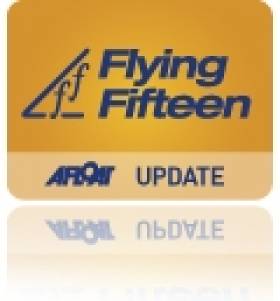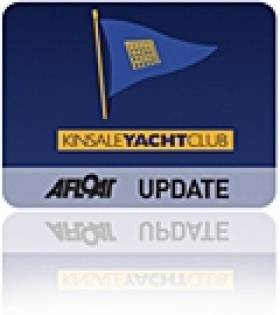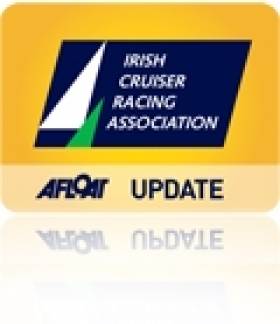Displaying items by tag: Mitsubishi Motors
Dun Laoghaire Flying Fifteens Announce Mitsubishi Motors Ireland as Fleet Sponsor
#flyingfifteen – One of Dublin Bay's most popular one design keelboat classes, the double handed Flying Fifteen, has been boosted with news of a new fleet sponsor for the upcoming 2015 season.
The Dun Laoghaire Flying Fifteen Fleet, which is mainly based in the National Yacht Club with over 25 registered boats, is delighted to announce that they are partnering with Mitsubishi Motors Ireland in what promises to be another exciting season.
Mitsubishi Motors Ireland is delighted to be on board as the fleet sponsor. Gerard Rice, Managing Director, says "Our new sponsorship of the Dun Laoghaire Flying Fifteen's fleet is an important partnership considering our heritage in the sailing community, who use our range of 4x4 vehicles for their reliability and superior performance".

The 2015 season is shaping up to be very busy with the class recently publishing its 2015 fixture list with events in Strangford Lough, Dunmore East, Dromineer and Antrim with the season's finale, the Mitsubishi Motors Championships of Ireland hosted by the National Yacht Club in September.
Kinsale Yacht Club Wins Club of the Year Award
#cluboftheyear – Kinsale Yacht Club have been confirmed as the Mitsubishi Motors "Sailing Club of the Year" for 2014 in celebration of an outstanding year during 2013, in which Commodore Cameron Good led his enthusiastic membership through a busy programme of activities, innovations and improvements. There was top sailing achievement afloat, too, both in hosting a remarkable series of major events – regional, national and international – and in the members' own winning of trophies afloat.
In the pretty south coast sailing and fishing port of Kinsale, KYC is one of the major focal points in the town. It interacts vigorously with its community, while at the national and international level, it has set the pace in communication and image projection through an excellent upgrade of its website, which saw it being the winner of the Afloat.ie Club Website award.
Domestically, the club initiated a major upgrade of its harbourside premises which was project-managed with exceptional skill – the builders moved in at the beginning of March, and the job was completed on time in late June ready for Kinsale YC's hosting of its biennial major regatta, the Sovereign's Trophy.
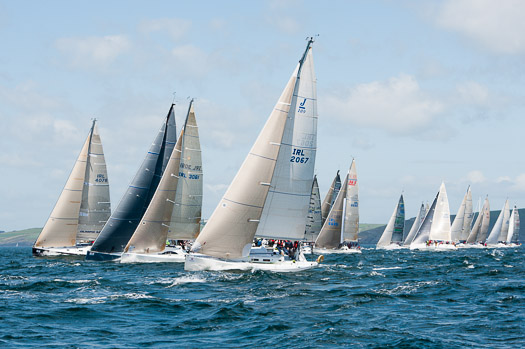
Racing for the Sovereigns Trophy 2013, with Kinsale YC organising the event, their own boats getting into the frame, and the superbly re-vamped clubhouse waiting to welcome everyone back to shore. Photo: Bob Bateman
Very deservedly, the KYC team got the weather they needed to make the Sovereigns one of the highlights of the Irish sailing year, with strong sunshine and fine sailing breezes ushering in the proper summer after the unsettled weather of June.
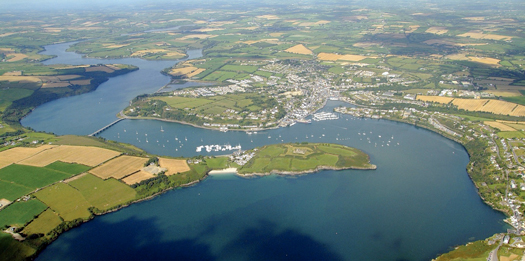
(Above and below) Kinsale Yacht Club's sailing waters and the race area for both the IFDS worlds and Sovereign's Cup in 2013. Photo: Bob Bateman
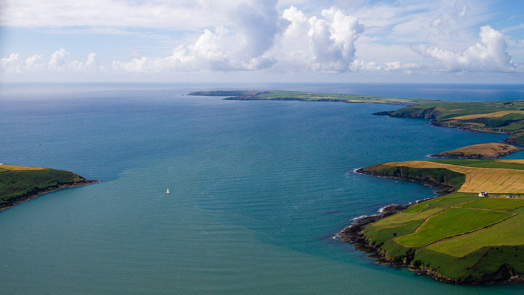
One of the great strengths of Kinsale sailing is that, in addition to cheerfully fulfilling their hospitality duties in having a popular marina which is the key port for hundreds of cruising boats coming to Ireland every year, plus the club's ready ability to provide a top class race management team when visiting classes request it, the club also has its own very active local racing fleet. There's a strong out-turn of cruisers augmented by a growing fleet of the Squibs which have proven to be ideal for Kinsale's needs, while the keen fleet of Lasers is another part of the Kinsale fabric, balanced in turn by the heritage represented by the International Dragons in which, over many years, Kinsale has sent forth teams to win at global level.
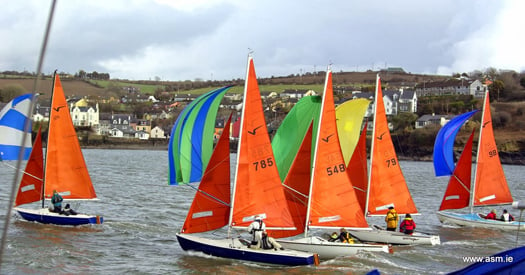
A sailing club's achievement would be hollow if it only hosted major events. Kinsale's strength is under-pinned by its strong inshore racing classes, with the Squibs – seen here racing in the current early-season series – developing into one of the strongest fleets in the country. Photo: Aidan McLaverty
The club also plays an active role in providing talented administrators for national and international sailing bodies. David Tucker of Kinsale completed his tour of duty as Commodore of the Irish Cruising Club just last month, while KYC's former commodore John Twomey was elected President of the International Federation for Disabled Sailing in November 2012, a position he continues to fill with energy, enthusiasm, and a great ability to get things done.
Thus it was John Twomey's unrivalled prestige in the international world of disabled sailing that saw Kinsale hosting the highlight of its 2013 season, the IFDS Worlds in August. This was a very major event, an exceptionally international series in which the large fleet required the dedicated effort of something like 120 volunteers drawn from the KYC membership, while the club spread its community involvement beyond the confines of the town by bringing in Cork County Council as the main sponsor.
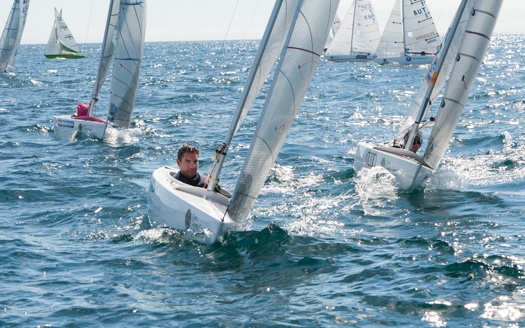
Summertime off Kinsale. KYC's staging of the IFDS Worlds in August 2013, with Cork County Council the main sponsors, achieved global recognition and was one of the highlights of the Irish season in 2013. Photo: Bob Bateman.
The outcome was a hugely successful event in which a genuine dynamic interaction between land and sea was played out every day. And it was all of a piece with KYC's very positive attitude to its role in sailing, in its own town, in Cork County, and in Ireland and the world. Kinsale Yacht Club is indisputably Ireland's Mitsubishi Motors "Sailing Club of the Year" for 2014.
National Award for Irish Cruiser Racing Association (ICRA)
In the three decades and more of the Mitsubishi Motors/Irish Independent "Sailing Club of the Year" assessments, there has never been an organization only seven years old winning the title.
In fact, seniority has often won the day, though in a country in which the oldest sailing clubs date from 1720 (Royal Cork) and 1770 (Lough Derg), it's difficult to find clubs and associations which are anything less than centenarians, let alone not yet in double figures.
But it was only as recently as June 2003 that the Irish Cruiser Racing Association came into being. It was at the biennial Sovereign's Cup series in Kinsale that Fintan Cairns of Dun Laoghaire, enthusiastically supported by the late Jim Donegan of Cork and other key personnel, successfully launched the idea of a nationwide organisation to co-ordinate the racing sport of "boats with lids".
At the time, it was a leap of vision. Having successfully headed Dublin Bay Sailing Club at a time of rapid growth, he was able to see the picture more clearly than those who reckoned that offshore racing organisations should be related to bodies of water rather than a land mass, for all that we're on an island.
Then too, the new association was envisaged as using established clubs and their facilities to stage its championship. In other words, the ICRA organising team would be the travelling people of the Irish sailing scene. On top of that, handicap competition with cruiser-racers was derided as "truck racing" by the white hot one design and dinghy sailors.
Yet the idea took hold, and the annual championship was successfully staged at venues as various as Crosshaven, Tralee, Howth, Kinsale and Dun Laoghaire, with Denis Kiely the essential ace number-cruncher in the back office. And in May 2010, with the mighty machine of the Royal St George YC in Dun Laoghaire providing the administrative centre, the Liebherr Irish Cruiser Nationals in Dublin Bay attracted a fleet of 117 boats, with great sailing.
On that event alone, ICRA would have been among the front runners for Club of the Year. But the best was yet to come. In recessionary times, getting a three boat team together to make a worthwhile challenge for the biennial Rolex International Commodore's Cup was a matter of making the best of limited resources. But ICRA – currently under the leadership of Barry Rose of Cork - was up to the job.
The team of Anthony O'Leary's Antix, Dave Dwyer's marinerscove.ie, and Rob Davis and Andrew Creighton's Roxy 6, had a convincing win. Thus ICRA in one season had catered very well for general run of boats and crews at home, and had come out tops at the top level internationally. It doesn't get better than that, and we salute them as Sailing Club of the Year 2011.


























